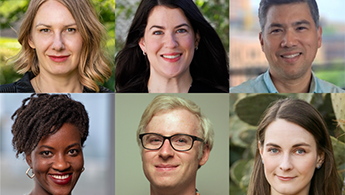Ivuoma Onyeador
Associate Professor of Management and Organizations
IPR Fellow (on leave 2024–25)
Ivuoma Onyeador is Assistant Professor of Management and Organizations. Her research examines how people judge and respond to group-based discrimination and disparities. Through her research program, she aims to increase people’s understanding of and willingness to address inequality. Onyeador’s research has been published in leading journals such as Psychological Science and Personality and Social Psychology Bulletin. Her work has also been featured in popular press outlets, including The New York Times and The Atlantic.
In recognition of her contributions, she has been named a "Rising Star" by the Association for Psychological Science, selected for the SAGE Early Career Trajectory award by the Society for Personality and Social Psychology and for a Mission Award from the Society for the Improvement of Psychological Science. In 2022, she was named one of the best 40 under 40 MBA professors by Poets & Quants. In 2024-2025, she'll be on leave at Harvard Business School.
Current Research
Moving Beyond Implicit Bias Training to Address Diversity, Equity, and Inclusion. Many organizations are working to address diversity, equity, and inclusion. Organizations frequently use hidden bias to explain disparities and see implicit bias training as a solution. In Policy Insights from the Behavioral and Brain Sciences, Onyeador and colleagues find that implicit bias is difficult to change and trainings do not change the amount of diversity in organizations, so organizations should move beyond implicit bias trainings in their diversity, equity, and inclusion efforts. They argue that organizations should (a) use trainings to educate members of their organizations about bias and about organizational efforts to address diversity, equity, and inclusion; (b) prepare for, rather than accommodate, defensive responses from dominant group members; and (c) implement structures that foster organizational responsibility for diversity, equity, and inclusion goals; opportunities for high-quality intergroup contact; affinity groups for underrepresented people; welcoming and inclusive messaging; and processes that bypass interpersonal bias. Although no simple, one-size-fits-all solutions address organizational diversity, organizational leaders have many tools they can use to design more effective diversity strategies.
Working to Correct Misperceptions About Modern Racial Economic Equality. Although there has been some progress toward economic equality between Americans over the past half-century, many Americans are largely unaware of the persistence of economic racial inequality. One intervention for this widespread ignorance is to inform White Americans of the impact of racism on the outcomes of Black Americans. In two studies, Onyeador and her associates attempt to improve the accuracy of White people's perceptions of racial progress and estimates of contemporary racial economic equality. Reminding White Americans about the persistence of racial inequality led to less White Americans overestimating how much progress had been made toward racial economic equality between 1963 and 2016. Rather than modifying overestimates of modern racial economic equality, participants who read about disparities assessed the past as more equitable than participants who did not. The researchers also discuss implications of these findings for efforts to address Whites’ misperceptions of racial economic equality and to challenge narratives of American racial progress.
The Medical Student Cognitive Habits and Growth Evaluation (CHANGE) Study. Although researchers have long studied circumstances that shape prejudice, studies about long-term prejudice reduction have been more limited. In a 6-year study of 3134 non-Black physicians-in-training, Onyeador and her colleagues examine the effect of three medical school factors—interracial contact, medical school environment, and diversity training—on explicit and implicit racial bias measured during medical residency. When accounting for all three factors, previous contact, and baseline bias, they find that quality of contact continued to predict lower explicit and implicit bias, although the effects were very small. These results highlight the benefits of interracial contact during an impactful experience such as medical school. Ultimately, the researchers find that professional institutions can play a role in reducing anti-Black bias by encouraging more frequent, and especially more favorable, interracial contact.
Selected Publications
Onyeador, I., S. Mobasseri, H. McKinney, and A. Martin. In press. A future for organizational diversity trainings: Mobilizing diversity science to improve effectiveness. Academy of Management Perspectives.
Danbold, F., I. Onyeador, and M. Unzueta. 2022. Digressive victimhood: How dominant groups counter claims of oppression. Journal of Experimental Social Psychology 98: 104233.
Onyeador, I., S. Hudson, and N. Lewis. 2021. Moving beyond implicit bias training: Policy insights for increasing organizational diversity. Policy Insights for the Behavioral and Brain Sciences 8(1): 19–26.
Onyeador, I., N. Daumeyer, J. Rucker, A. Duker, M. Kraus, and J. Richeson. 2021. Disrupting beliefs in racial progress: Reminders of persistent racism alter perceptions of past, but not current, racial economic equality. Personality and Social Psychology Bulletin 1–13.
Carter, E., I. Onyeador, and N. Lewis Jr. 2020. Developing & delivering effective anti-bias training: Challenges and Recommendations. Behavioral Science & Policy (6)1: 57–70.
Onyeador, I., N. Wittlin, S. Burke, J. Dovidio, S. Perry, R. Hardeman, L. Dyrbye, J. Herrin, S. Phelan, and M. van Ryn. 2020. The value of interracial contact for reducing anti-Black racial bias among non-Black physicians: A CHANGE study report. Psychological Science 31(1):18-30.
Kraus, M., I. Onyeador, N. Daumeyer, J. Rucker, and J. Richeson. 2019. The misperception of racial economic equality. Perspectives on Psychological Science 14(6): 899–921.
Daumeyer, N., I. Onyeador, X. Brown, and J. Richeson. 2019. Consequences of attributing discrimination to implicit vs. explicit bias. Journal of Experimental Social Psychology 84:103812.


